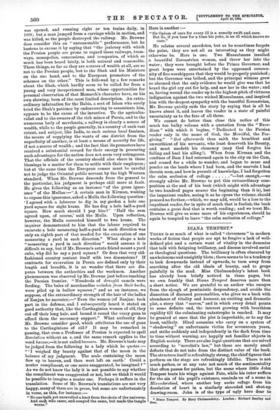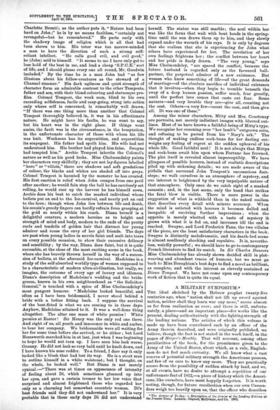DIANA TEMPEST.*
THERE is so much of what is called " cleverness " in modern works of fiction that people are apt to forgive a lack of well- defined plot and a certain want of vitality in the dummies that talk with fatiguing brilliancy, and discuss involved social or theological questions. The brilliancy is often obscured by unwholesome and unsightly blots ; there seems to be a tendency to look downwards instead of upwards, to turn away from searching after the old ideals of beauty, and to grope painfully in the mud. Miss Cholmondeley's latest book has already been briefly noticed in these pages, but we own frankly that Diana Tempest deserves more than a short notice. We are grateful to an author who escapes from the slough of pessimistic despondency, and avoids the dissection of diseased personalities, who gives us a book with abundance of vitality and humour, an exciting and dramatic plot, a story that " moves," and in which every detail points to some definite end, the interest growing with breathless rapidity till the culminating catastrophe is reached. It may be granted at once that the plot is improbable, or to say the least, unlikely. Hired assassins who carry on a system of " shadowing " an unfortunate victim for seventeeen years, and strike suddenly and independently in the dark from time to time without warning, are happily not familiar objects in English society. There are also legal questions that are solved according to "novelist's law," but these are merely small defects that do not take from the distinct value of the book. The structure itself is refreshingly strong, the chief figures that perform on the stage are refreshingly lifelike. There is not much pathos, or at any rate not much of the sentimentality that often passes for pathos, but the scene where little John Tempest beats his wings against Fate, while his tutor suffers for the sin of his pupil's existence, reminds us of a scene in Misunderstood, where another boy seeks refuge from his desolation of heart in a similarly shrouded and shut-up drawing-room. John is of the type of ugly hero dear to
By Mary Cliolmondeley. London Richard Bentley and
Charlotte Brontë; as the author puts it, " Nature had been hard on John ;" he is by no means faultless, " certainly not revengeful—but he remembered." He parts early with the shadowy image of religion which is all that had been shown to him. His tutor was too narrow-minded a man to have the direction of such a strong self- reliant intellect. " He calls good evil, and evil good," he (John) said to himself. "It seems to me I have only got to lose hold of the best in me, and lead a cheap S.P.C.K.' sort of life, and I should please every one all round, Mr. Goodwin included." By the time he is a man John had " as few illusions about his fellow-creatures as the steward of a Channel steamer." His dark ugliness and quiet strength of character form an admirable contrast to the other Tempests, father and son, with their blond colouring and statuesque pro- files. Colonel Tempest, the weak man, blind to his own exceeding selfishness, facile and easy-going, stung into action only where self is concerned, is remarkably well drawn. "If there was one thing more than another that Colonel Tempest thoroughly believed in, it was in his affectionate nature. He might have his faults, he was wont to say, but his heart was in the right place. If things went amiss, the fault was in the circumstance, in the temptation, in the unfortunate character of those with whom his life was knit. Weakness has its superstition, and superstition its scapegoat. His father had spoilt him. His wife had not understood him. His brother had played him false. Swayne had tempted him." Archie Tempest inherits the Colonel's nature as well as his good looks. Miss Cholmondeley paints her characters very skilfully ; they are not lay-figures labelled "hero" or "villain," there are shadows and soft gradations of colour, the blacks and whites are shaded off into greys. Colonel Tempest is haunted by the monster he has created. His first emotion is relief when John escapes from one peril after another ; he would fain stop the ball he has carelessly set rolling, he would root up the harvest he has himself sown. Archie does his best to catch the masked individual whose bullets put an end to the Ice-carnival, and nearly put an end to the hero ; though when John lies between life and death, his cousin's greedy fingers can hardly refrain from grasping at the gold so nearly within his reach. Diana herself is a delightful creature, a modern heroine as to height and strength of mind and body, modern to the ends of the pretty curls and tendrils of golden hair that distract her young admirer and rouse the envy of her girl friends. The days are past when young ladies in novels faint and melt into tears on every possible occasion, to show their excessive delicacy and sensibility ; by the way, Diana does faint, but it is quite excusable, at the close of the most exciting scene in the book, where she has bravely thrown herself in the way of a succes- sion of bullets, at the aforesaid Ice-carnival. Madeleine is a study of the self-absorbed worldly type of woman supposed to be a characteristic of modern ultra-civilisation, but really, we imagine, the outcome of every age of luxury and idleness. Diana's description of Madeleine's wedding and the bride- groom, known in his own neighbourhood as " the Solicitor- General," is touched with a spice of Miss Cholmondeley's most pungent humour. " Madeleine looked beautiful, and often as I have been bridesmaid, I never stood behind a bride with a better fitting back. I suppose the survival of the best-fitted is what we are coming to in these days. Anyhow, Madeleine attained to it. It was a well-done thing altogether. The altar one mass of white peonies ! White peonies at Easter ! Sir Henry was the only red one there. And eight of us, all youth and innocence in white and amber, to bear her company. We bridesmaids were all waiting for her for some time before she arrived, or he either ; but Lord Hemsworth marched him in at last, just when I was beginning to hope he would not turn up. I have seen him look worse, Granny. He did not look so very bald until he knelt down, and I have known his nose redder. To a friend, I dare say it only looked like a blush that had lost its way. He is a stout man to outline himself in a white waistcoat; but I thought. on the whole, he looked well." But Diana is not merely cynical :—" There was at times an appearance of intensity of feeling about Di, which sometimes gleamed up into her eyes, and gave a certain tremor to her low voice that surprised and almost frightened those who regarded her only as a charming but somewhat eccentric woman. Di's best friends said they did not understand her." It is very probable that in those early days Di did not understand herself. The statue was still marble; the soul within her was like the ferns that wait with bent heads in the spring- time until the sun draws them up to him, and they slowly expand under the warmth of his rays. It is only by degrees that she realises that she is experiencing for John what others have experienced for her. The revelation of her own feelings frightens her ; the conflict between her heart and her pride is finely drawn. " The very young," says Miss Cholmondeley, " are spared the conflict, because the future husband is regarded only as the favoured ball- partner, the perpetual admirer of a new existence. But women who know something of life—of the great demands of marriage—of the absolute sacrifice of individual existence that it involves—when they begin to tremble beneath the sway of a deep human passion, suffer much, fear greatly, until the perfect love comes that casts out fear. Some natures—and very lovable they are—give all, counting not the cost. Others—a very few—count the cost, and then give all. Di was one of these."
Among the minor characters, Mitty and Mrs. Courtenay are portraits, not merely indistinct images with blurred out- lines. Most of us have known a faithful being of Mitty's type. We recognise her crooning over "her lamb's " outgrown suits, and refusing to be parted from his " Noey's ark." The thought of making endless rock-buns for her darling out- weighs any feeling of regret at the sudden upheaval of his whole life. Good faithful soul ! It is not always that Mittys and rock-buns await him upon whom Fortune has frowned. The plot itself is revealed almost imperceptibly. We have glimpses of possible horrors, instead of realistic descriptions piled up with sickening details ; we are made aware of the pitfalls that surround John Tempest's unconscious foot- steps ; we walk ourselves in an atmosphere of mystery, and our interest is heightened by the very impalpable nature of that atmosphere. Only once do we catch sight of a masked assassin ; and, in the last scene, only the hand that strikes the fatal blow is visible. There is more power in the suggestion of what is withheld than in the naked realism that describes every detail with minute accuracy. When the mind is satiated with horrors it becomes dulled and incapable of receiving further impressions ; when the appetite is merely whetted with a taste of mystery it grows with what it is fed on, and increases till the end is reached. Swayne, and Lord Frederick Fans, the two villains of the piece, are the least satisfactory characters in the book. Swayne is distinctly melodramatic, and his death-bed scene is almost needlessly shocking and repulsive. It is, neverthe- less, weirdly powerful ; we should have to go to contemporary French literature to find its match. In Sir Charles Danvers Miss Cholmondeley has already shown decided skill in plot- weaving and abundant traces of humour, but we must go back to Miss Broughton's best days to find a novel as brilliant, as complete, and with the interest as cleverly sustained as Diana Tempest. We have not come upon any contemporary work of fiction that is quite its equal.



















































 Previous page
Previous page